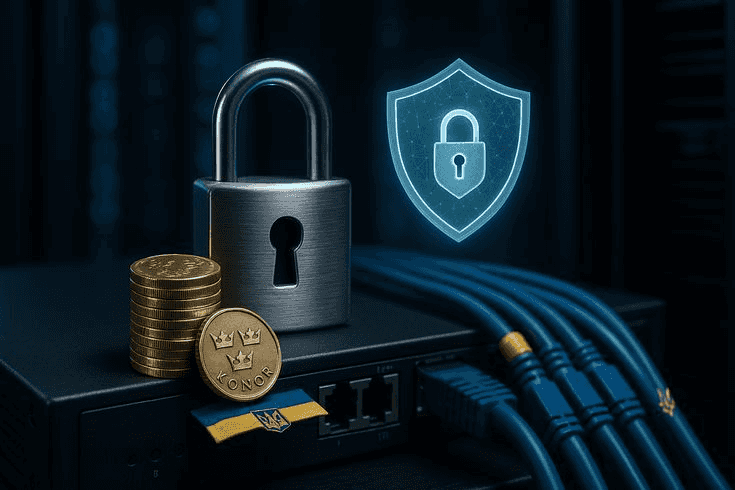Cybersecurity Partnerships: The Smarter Way for Vendors to Connect with CISOs
For CISOs, cold emails, generic pitch decks and endless sales calls are the daily noise of vendor outreach. The reality? Most of these efforts don’t break through. In a world where security leaders are pressed for time and bombarded with countless vendor offers, what makes the difference is not volume, but trust. And trust is best built through cybersecurity partnerships.
CISOs don’t need more vendors; they need partners who share their challenges and accountability. That’s how trust and long-term relevance are built. — Val Tsanev, CEO of Execweb
For vendors, shifting from transactional selling to partnership-driven engagement is no longer optional; it’s a smarter way forward. With cybersecurity threats escalating and budgets under scrutiny, CISOs want relationships that add strategic value, not more tools that crowd their stack.
This blog highlights why CISO-vendor partnerships are transforming cybersecurity dynamics, how they enhance sales impact, and what vendors can do to capitalize on this more effective model.
The Rising Importance of Cybersecurity Partnerships
Cybersecurity is no longer a back-office function; it’s a boardroom priority. According to Gartner, global security and risk management spending has surpassed $215 billion in 2024, with organizations prioritizing solutions that integrate seamlessly into their ecosystem.
This shift has fueled a rise in cybersecurity vendor partnerships, where solutions aren’t sold in isolation but embedded into broader strategies. Instead of being just another “vendor,” companies that form partnerships become trusted advisors, helping CISOs achieve resilience, compliance, and efficiency at scale.
Why Partnerships Resonate with CISOs
For CISOs, time is their most limited and valuable resource. Security teams are stretched thin, often balancing compliance demands, incident response, and executive reporting with limited headcount. In this environment, leaders don’t just want more tools; they want measurable outcomes that directly improve resilience and reduce risk. This is where cybersecurity partnerships make a meaningful difference.
Efficiency: Integrated solutions streamline workflows, reduce tool sprawl, and simplify management. By eliminating redundancies, CISOs can allocate time and resources more effectively.
Trust: Long-term collaboration signals that the vendor is a reliable ally who will be around to support evolving needs, not just deliver a one-off product.
Strategic Alignment: Effective partners understand that cybersecurity is fundamentally a business risk. They work to align defenses with broader organizational priorities rather than focusing narrowly on technical fixes.
Shared Risk: When vendors operate as true partners, they share accountability for success. This changes the dynamic from transactional to collaborative.
For these reasons, CISOs are increasingly drawn to vendors who show up as collaborators, not product pushers, partners who commit to helping them navigate complexity and achieve lasting outcomes.
Benefits of Cybersecurity Partnerships for Vendors
For vendors, the value of cybersecurity partnerships extends far beyond short-term sales. The right alliances unlock access, credibility, and long-term growth opportunities that are difficult to achieve alone.
Accelerated Market Access: Partnerships with trusted players open doors to accounts that could take years to penetrate. Warm introductions from partners give vendors instant credibility with CISOs.
Higher Conversion Rates: With trust already established, sales cycles become shorter and smoother. Instead of proving value from scratch, vendors benefit from their partner’s endorsement, which helps turn interest into commitment faster.
Increased Revenue per Customer: Strategic partnerships often expand into multi-year, multi-product relationships. Over time, this deepens customer engagement and creates more sustainable revenue streams.
Differentiation in a Crowded Market: With thousands of security vendors competing for attention, being positioned as a partner rather than just a supplier helps vendors stand out. It signals reliability, innovation, and a commitment to shared outcomes, qualities that resonate with CISOs.
In a cybersecurity domain, where cold outreach often fails, cybersecurity vendor partnerships give vendors the credibility, reach, and staying power they need to succeed in connecting with decision-makers.
For a deeper dive into how vendors can turn these advantages into action, explore our free eBook: How Cybersecurity Vendors Can Leverage Partnerships.
Cybersecurity Vendor Channel Strategy: Building Smarter Routes to Market
A well-executed cybersecurity vendor channel strategy ensures that products and services reach CISOs through trusted and efficient avenues. Whether it’s via managed security service providers (MSSPs), strategic technology alliances, or peer-to-peer cybersecurity vendor partnerships, the objective is the same: amplify market reach while minimizing friction in the buying journey.
Examples of effective strategies include:
Technology Integrations: Seamless compatibility with widely used platforms such as Microsoft Sentinel, Splunk, or ServiceNow ensures easier adoption.
Co-Selling Programs: Partnering with complementary vendors to deliver bundled value propositions that resonate with CISOs.
Advisory Partnerships: Leveraging analyst firms, industry associations, and peer networks to validate credibility and build trust
When executed consistently, these approaches position vendors not just as suppliers, but as integral contributors to enterprise security ecosystems.
Cybersecurity Vendor Sales Strategy: Moving Beyond the Pitch
Traditional sales models often rely on aggressive prospecting. But CISOs don’t respond to pressure; they respond to relevance. A smarter cybersecurity vendor sales strategy focuses on:
Educating, Not Selling: Thought leadership content, workshops, and joint webinars demonstrate value.
Proof of Value: Case studies and pilot programs reduce perceived risk.
Relationship Building: Continuous engagement beyond the sales cycle ensures loyalty.
This shift in approach transforms vendors into trusted partners, ensuring CISOs see them as part of the solution, not part of the problem.
Best Practices for Cybersecurity Partnerships
To get the full benefits of cybersecurity partnerships, vendors must approach them with structure and intentionality. A strong partnership doesn’t just happen; it’s built over time through alignment, trust, and shared accountability.
Align on Shared Goals: Both vendor and CISO teams should pursue measurable outcomes, such as reducing incident response times, improving compliance readiness, or enhancing overall resilience.
Prioritize Transparency: Be clear about product capabilities, limitations, and costs. Overpromising or hiding weaknesses erodes trust faster than anything else.
Invest in Enablement: Offer training, playbooks, and technical resources that empower CISO teams to maximize adoption and see real value.
Maintain Consistent Communication: Regular business reviews, joint planning sessions, and feedback loops help partnerships adapt to shifting risks and priorities.
Focus on Long-Term Value: Position solutions as scalable, sustainable offerings; not temporary fixes.
When executed consistently, these practices strengthen trust, accelerate adoption, and position vendors as indispensable long-term partners.
Challenges to Avoid in Cybersecurity Partnerships
While partnerships unlock immense value, vendors must be aware of common pitfalls:
One-Sided Relationships: Partnerships fail when vendors prioritize their sales goals over the CISO’s strategic needs.
Overcomplex Integrations: A solution that complicates the existing stack undermines the promise of efficiency.
Lack of Measurable Impact: Partnerships without clear success metrics risk being seen as “nice-to-have” rather than essential.
Neglecting Post-Sale Engagement: Many vendors disappear after the contract is signed, missing opportunities for expansion.
Avoiding these challenges is critical to sustaining long-term, mutually beneficial relationships.
Conclusion: The Smarter Way Forward
Cybersecurity is entering an era where partnerships define success. For vendors, embracing cybersecurity partnerships isn’t just about boosting sales; it’s about building trust, aligning with strategic priorities, and creating shared value.
CISOs no longer want more tools; they want fewer, stronger relationships with partners who understand their challenges. By adopting best practices, avoiding common pitfalls, and leveraging platforms like Execweb, vendors can position themselves not just as solution providers but as indispensable allies in the fight against evolving cyber threats.
By positioning vendors within a partnership-first environment, Execweb ensures that every interaction is high-value and relationship-driven.
Contact us to book 1:1 meetings with relevant CISOs from Fortune 1000.









Comment